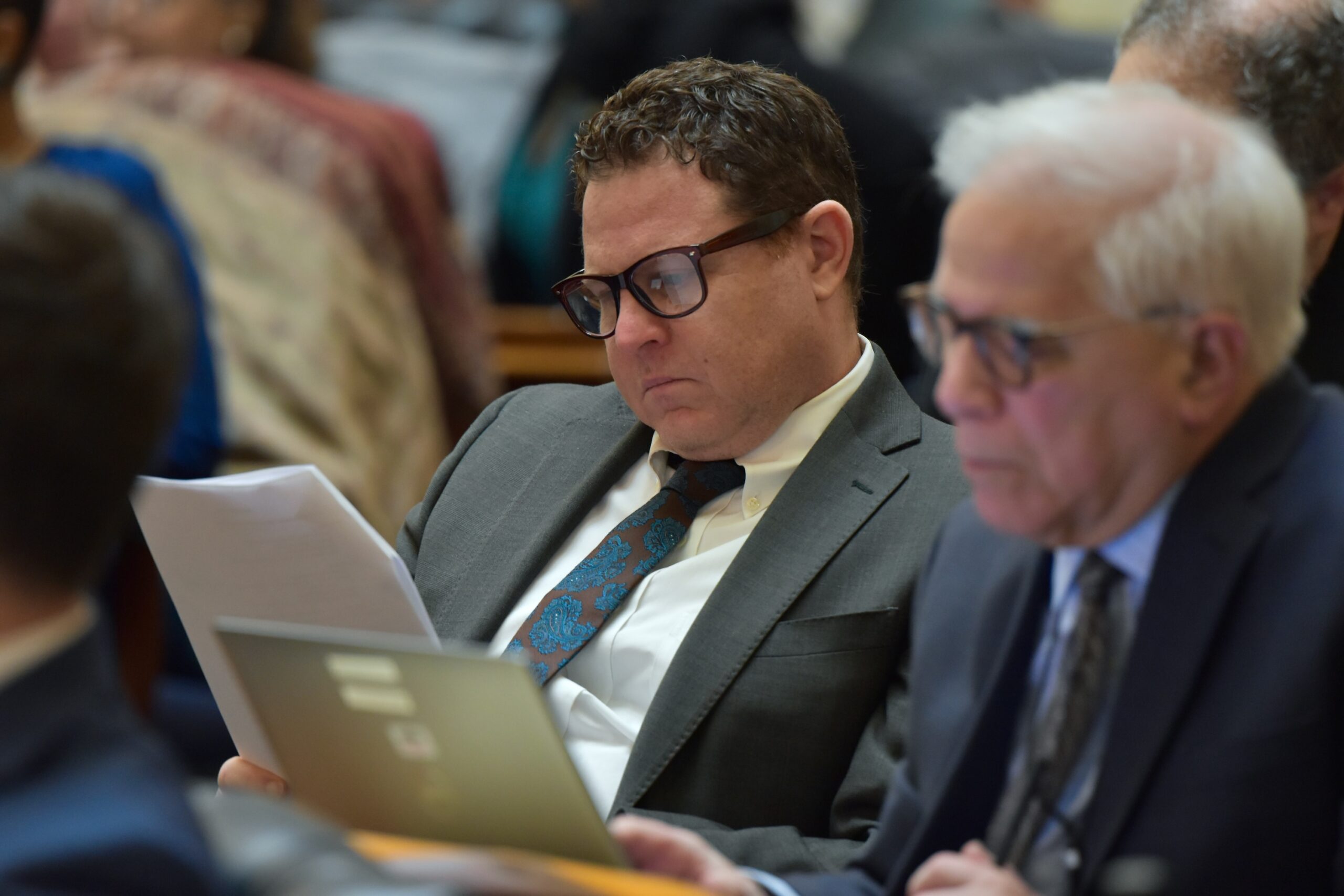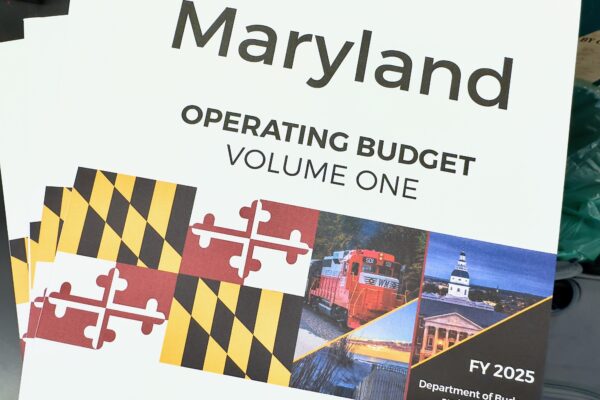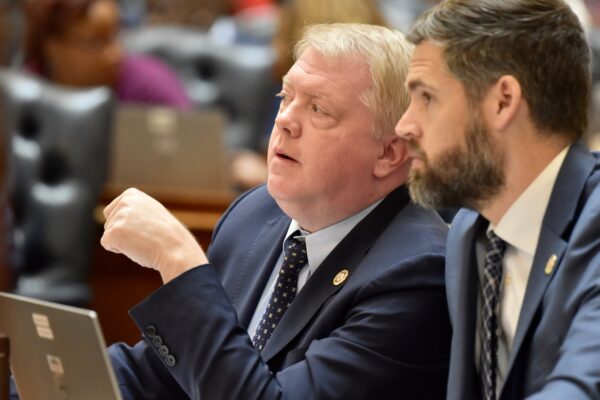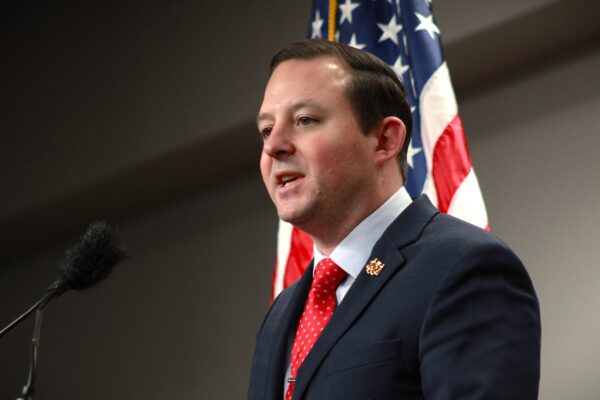Increase to sin taxes added to ‘panoply of options’ in the House

A top Democrat in the House is proposing nearly $90 million in taxes on alcohol and cigarettes as part of an effort to address billions of dollars in projected budget gaps.
Democratic leaders in the House and Senate do not agree on how to tackle the revenue shortfall issue this session. Del. Ben Barnes (D-Prince George’s and Anne Arundel), the chair of the House Appropriations Committee and others would like to prime the pump now so tax dollars are flowing when the budget gap widens.
“I noticed you all have a lot of revenue bills and I’m certainly not an expert on revenue by any means,” Barnes told members of the House Ways and Means Committee Tuesday. “What I do know, sitting in my seat on the Appropriations Committee, is that we need revenue.”

Budget books for the fiscal 2025 budget proposed by Gov. Wes Moore (D). Photo by Bryan P. Sears.
Maryland faces a projected structural deficit in its operating budget that could reach $3 billion by fiscal 2028.
Barnes said failure to act would harm vital programs, including the state’s Blueprint for Maryland’s Future education reforms.
“Some would say we can sort of try to cut our way out of the problems we face,” said Barnes. “Let me tell you, from my seat, $3 billion — those are not cuts that we will be able to make and balance a budget. Three billion dollars is the cancellation of the Blueprint program. It’s cutting Medicaid. It’s cutting community colleges and higher ed and all the things that make our state great.”
Barnes is the sponsor of House Bill 1072 and House Bill 1073.
The former proposes increasing the current per pack tax on cigarettes by 75 cents to $4.75. The latter proposes increasing the sales tax on alcohol by a penny to 10 cents on the dollar — an amount that would be 4 cents on the dollar more than the general sales tax.
Analysts estimate Barnes’ proposed increase of the alcohol tax would bring the state $27.8 million for the General Fund and another $3.5 million for education.
The same analysis projects that a business doing $1 million in taxable alcohol sales would see a decrease of about $7,200 attributable to the tax rate increase.
Barnes’ proposed increase on the per pack tax on cigarettes would generate $54.1 million in new revenue. The amount includes a one-time assessment on cigarettes already in the hands of distributors and retailers.
Of that amount $46.1 million would go to the General Fund.
Analysts warn that revenue would decrease in future years as the tax results in “projected declines in cigarette consumption.”
Some retailers assert that the declines will not be the result of smoking less. Instead, smokers will travel to neighboring states to buy cigarettes taxed at a lower rate. State law allows residents to bring five cartons of cigarettes into Maryland from other states for personal use.
Organizations including the American Cancer Society and American Lung Association asked the committee to double Barnes’ proposed increase. The move, they said, would generate another $50 million in revenue while also decreasing smoking over time.
Barnes said he proposed the two bills because there were no other measures seeking increases in the so-called sin taxes this legislative session.
“I feel it’s important that you have all the options available to you,” Barnes told the Ways and Means Committee. “So I put these two bills in to add to the panoply of options that you have in front of you in hopes that we do have a point where we acknowledge that we’re not going to be able to make $3 billion in cuts.”
Barnes faced no questions from the committee about either proposal.

House Minority Leader Del. Jason C. Buckel (R-Allegany). Photo by Bryan P. Sears
“I don’t believe that there’s a significant appetite for these tax increase proposals,” said House Minority Leader Jason C. Buckel (R-Allegany) when asked why Barnes faced no questions from committee members, including Republicans. “Marylanders know that raising taxes on middle class folks buying a beer or even cigarettes isn’t going to solve our massive spending problems looming ahead and businesses know that all it will do is push sales and revenue into neighboring states.”
Barnes’ bills could act as placeholders for some late action or added to a package of revenue options should that appetite — especially in the Senate — change before the legislature adjourns on April 8.
Gov. Wes Moore (D) and the legislature faced the prospect of starting the 2024 session with roughly $1.1 billion in cash deficiencies and a structural budget deficit of $761 million for fiscal 2025.
Moore released his proposed budget in January. In that proposal, he claimed to flip the $1.1 billion cash shortfall to a $100 million surplus. He also said he reduced the structural budget deficit by 34% to $502 million.
Budget concerns could continue to dog the state through the rest of Moore’s first term.
Analysts project the structural budget deficit will grow next year to $1 billion. In fiscal 2027, the last year of Moore’s term, it grows to $1.3 billion. A year later, it more than doubles to $3 billion — about 12% of the general fund revenues projected for that year.
None of this includes the $3.1 billion shortfall over five years in the Transportation Trust Fund. Moore and Transportation Secretary Paul Wiedefeld presented a doomsday budget that slashes spending on road and transit projects across the state.
That proposal was temporarily shelved when Moore announced he found $150 million for the coming year — enough to avert an initial hit to local government priorities.
Those cuts are back on the table next year as lawmakers, Moore and the blue-ribbon Transportation Revenue and Infrastructure Needs Commission search for ways to modernize the state’s Transportation Trust Fund revenues.
Barnes and House Ways and Means Chair Vanessa E. Atterbeary (D-Howard) has each signaled a willingness to find more tax revenue this year.
Senate leaders are not yet ready to move on taxes.
Senate Budget and Taxation Chair Guy Guzzone (D-Howard) and Senate President Sen. Bill Ferguson (D-Baltimore City) have repeatedly rejected exploring tax increases this year.

Senate President Bill Ferguson (D-Baltimore City) on Jan. 29, 2024. Photo by Danielle J. Brown
The Senate is expected to complete its work on the budget in the next two weeks. Both chambers will get a clearer picture of the state’s finances when the Board of Revenue Estimates publishes its updated forecast next week.
The Senate is already faced with the additional pressure of $230 million in higher-than-expected Medicaid enrollees. That amount is spread out over two years.
“That’s $233 million over two years that was unanticipated, above projections,” Ferguson told reporters Tuesday. “That was a lot of the flex that we thought that we were going to see in the budget. So, it’s going to make it harder. We’re going to have to be even tighter than we thought because of some of the adjustments that have come in, just makes it a little bit more difficult to backfill in certain areas.”




 Creative Commons Attribution
Creative Commons Attribution